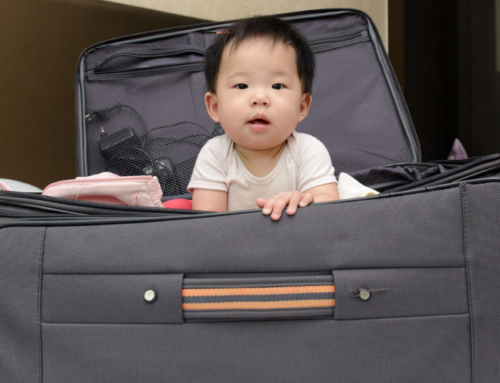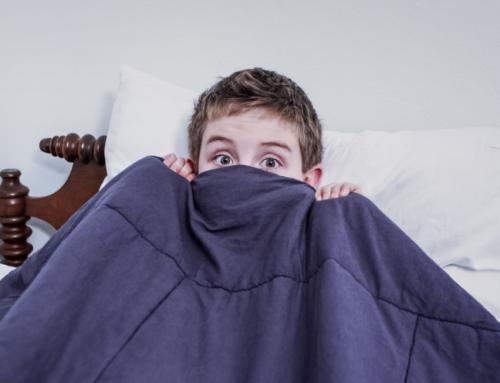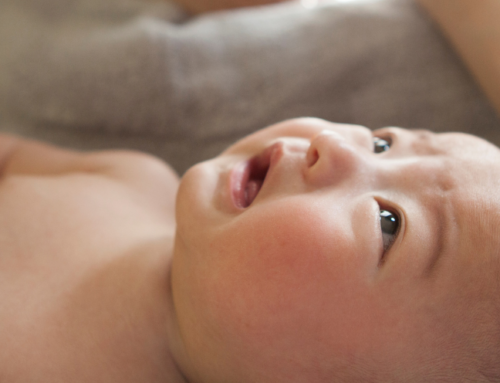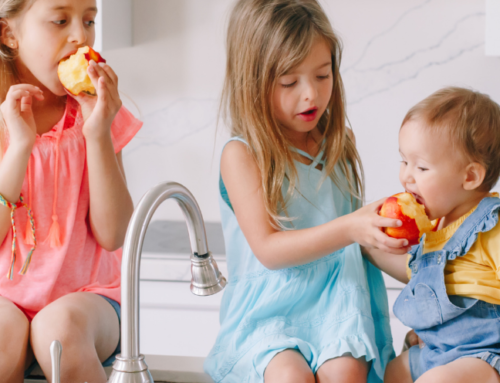12 Tips to help kids sleep well during the holiday season
‘Tis the season for holiday festivities and excitement. The tinsel, the lights, the presents! The sweet treats and parties. The family visits and travels, the food and the late nights. All the holiday excitement can disrupt sleep in both the big and little people, and in little people it can lead to some pretty massive meltdowns.
In this post I am sharing 12 tips to help the whole family navigate the holiday season well rested and full of vitality to enjoy the festivities.
TIP 1: Travelling or staying in another place that’s not home?
First night effect
Do you know about the first-night effect? When in unfamiliar surroundings while we sleep one part of the brain remains vigilant on the first night for protection. While it hasn’t been researched in children, it’s likely they experience it too. If the holiday season brings new sleep environments it might be that your little one may not feel as relaxed and safe as they do at home. They may need, for example, your comforting presence while they fall asleep to help them ease into sleep easier.
Prioritise sleep safety
If you are travelling, make sleep safety a priority. Read about how to keep your little one safe and create a safe sleep environment at Red Nose Australia.
If co-sleeping makes everyone’s life easier during the holiday season it’s ok to do this. Do what works for your family, you won’t create bad habits! Red Nose Australia has information on how to safely co-sleep here.
Bring a piece of home
To help them to ease into sleep easier when in an unfamiliar environment bring some of the comforting items used at home such as a special toy, comforter or calming essential oil spray. Even their favourite pyjamas or their unwashed sheets that smell of them and home can help. Consider music or white noise to help mask new noises and help them drift off.
Click here for some pre-sleep music relaxation music for children
A comfortable place to sleep
If you are travelling and not planning to co-sleep, plan ahead for where your child will sleep. If you are staying in accommodation, do they have a comfortable and safe place for your child to sleep? If they don’t have what you need, what can you bring with you?
Keep the sleep routine as consistent as possible
A consistent sleep routine before nap and bedtime can help children feel comfortable and relax easier into sleep. The hustle and bustle of the holiday season can create a feeling of uncertainty for little ones who don’t fully understand what is happening. If travelling it can create inconsistency as they are not in their own home. Following a sleep routine can help children feel safe and adapt better to changes in the environment. Your sleep routine will be unique to your family, but may include reading a book, brushing teeth and getting into pyjamas.
TIP 2: Help them wind down
There can be many reasons why your little one may have difficulty winding down during the holiday season. Sugary foods, new environments and people, lots of activity and noise, the hustle and bustle, the fun that they don’t want to miss out on. Prepare yourself ahead of time that they are going to have difficulty winding down and decide what tools to use to help them switch from active to a state of rest.
Would an evening stroll help calm them? Will you sit or lay with them until they go to sleep? Will you use massage, maybe a foot massage? What about music or singing? Extra reading time? Or maybe a designated quiet activity just prior to bed, like drawing or colouring, or for babies a feed, book and cuddle?
Something you might like to try is EFT or Emotional Freedom Technique which is backed by a growing body of research. It is a quick way to help ease any fears and bring the body into a state of rest, promoting sleep. EFT involves tapping on acupressure points while voicing an issue or statements. Have a look at this excellent resource on tapping from the Big Life Journal, with a specific section on tapping for sleep.
Brew chamomile tea and drink it (lukewarm) an hour before bed to help promote relaxation. For young children you may need to water it down or only have a small amount, such as a teaspoonful or two.
TIP 3: Be flexible with naps
If your little one still naps, following a strict schedule or making sure you are at home at specific times for naps can put stress on everyone. It’s ok to adjust nap times to attend events or have your little one nap on the go. It can help to schedule travel time around the time they generally have a nap.
If they are not napping, could they use some down time during the day to help them to get through the chaos and excitement that the holiday season can bring?
TIP 4: Keep wake time as consistent as possible
When your little one’s full of excitement for the holiday festivities they may wake earlier than normal and that is ok. They may just need an earlier bedtime. I have a chronic early riser so I know how hard it is to wake early day after day, but holiday early wakes are temporary. Try to enjoy the time you have with your little one and find ways to make precious memories while everyone else is still asleep.
If they’ve had a late night they may sleep past their usual wake time. Wake times with a huge variance each day can cause sleep disruption, so try not to let them sleep more than an hour past their usual wake time, or put them to bed a little earlier instead of having a sleep in. They may be tired the day after a late night, but going to bed a little earlier and having a good night’s sleep will help them bounce back quickly. If they wake grumpy try opening the blinds or getting them outside as exposure to natural light can help them to feel alert and improve their mood.
TIP 5: Do your best with night sleep
As much as possible, try and keep a consistent amount of night sleep. It may not be realistic to always have kids asleep at their regular time during the holiday season and a late night here and there is not going to destroy their sleep. When you feel they need bed, prioritize bedtime. If you follow your child’s cues, rather than a strict schedule, the holiday season will be easier to navigate.
TIP 6: It’s ok to say no. It’s ok to have some slow days
Prioritize your choices. It’s ok to not do it all. It’s ok to say no and not give a reason why you’ve said it. It’s ok not to pass your baby around to every family member. It’s ok to say no to a request to hold your baby. Since I’ve started to listen to my own needs and that of my child, and know my boundaries, it has gotten a lot easier to say no. I feel less overwhelmed and resentful at having to do things I don’t really want to do and the holidays are now far happier.
TIP 7: Embrace the light
A healthy light diet is one of the most important things you can do to promote a good sleep. The festive season is merry and bright, full of artificial lights. In some sensitive little ones excess exposure to artificial light at night is enough to disrupt their sleep. If you are travelling and staying in new places there may be bright lights at night in the sleep environment that can potentially disrupt sleep, or the window may not have block out blinds or curtains allowing light in that little bit too early in the morning.
To maintain a healthy light diet during the festive season:
- On waking, or within the hour of waking, expose your little one to natural light for at least 10 minutes, either through a window or by going outside. This switches off the release of melatonin, our sleepy hormone, and sets the time it will be released at night.
- Limit artificial lighting in the day. If it is bright enough outside, open the blinds and let the natural light in instead of turning on a light.
- Avoid napping in the dark as this disrupts the body’s inbuilt clock, the circadian clock. The day is meant to be bright, light and full of activity. The night is meant to be dark and quiet. In an experiment 12 young men were asked to stay awake throughout the night. In the morning they caught up on sleep under two different conditions. Half were asked to sleep in a dimly-lit room (under 50 lux) and half were asked to sleep in a brightly lit room (3000 lux). The rise of melatonin levels in the evening was monitored in each participant. Those who napped in a brightly-lit room had their melatonin levels rise earlier in the evening (Nagashima et al 2018). This study highlights that napping in bright natural light can help us fall asleep earlier, compared to napping in a dimly-lit or dark room.
- If you can, get outside at sunset. Exposure to the different lighting at sunset cues the body’s inbuilt clock that night is approaching, and thus sleep.
- Dim the lights at night to prepare the body that sleep will be coming.
- Use travel block out blinds or bring a thick sheet to use if you need to cover the window to keep the room dark at night and ensure the sun doesn’t wake your little one too early.
- Limit screens in the evening, preferably turning off screens an hour before bed. Leave screens out of the bedroom if you can.
- Be mindful of artificial lights in the bedroom. The light from nightlights, fans, alarm clocks, humidifiers, street lights, smoke alarms etc can all disrupt sleep. Unless they have a red light they will be emitting blue/green light which blocks melatonin’s release. It may seem like a small thing, but it can make a big difference in a child’s sleep if they are sensitive to light.
I’ll tell you a little story about how artificial light affects my daughter’s sleep. The law in Australia has recently required smoke alarms to be installed in all bedrooms and the smoke alarms that were installed emit a green light. My daughter, who never wakes at night unless sick, woke up 5-6 times throughout the night and told me the next day that the light made her wake. I blocked out the light on the alarm and the next night she slept through. So don’t underestimate the effect artificial lights can have on sleep.
If you are travelling, bring some blu tack with you. It is handy to block out artificial lights on devices, either using the blu tack itself or using the tack to hold on a thick piece of paper to cover the light.
TIP 8: Limit screens
It can be tempting in the holiday season to rely on screens to distract and keep little ones quiet and busy. Screens though emit blue light. In the day, blue light from screens in moderation is ok. However, in the evening screens should be avoided within an hour of bedtime as they block the release of melatonin, our sleepy hormone. Passive exposure, such as scrolling the phone while holding the baby, should also try to be limited before bedtime.
In addition, be mindful of content watched on screens, as it can cause anxiety and push them into a sympathetic nervous state, making it hard for them to wind down and sleep.
TIP 9: Tune in to your little one
Sometimes it is not a lack of sleep that is causing your little one to struggle or meltdown over the holiday season. Sometimes it is because they’ve just had enough of being handed around from one family member to another. Or all the noise and activity is overwhelming them.
In the busyness of the holiday season it can lead to more than normal sensory input bombarding the brain and nervous system to the point that they cannot process the sensory messages, causing sensory overload. Sensory overload is common in the fast-paced world we live in and is not the same as sensory processing disorder. Asensorylife.com has a great article on sensory overload.
Some children can handle, and even crave, more stimuli than others. Some are very sensitive to certain stimuli. Everyone has different sensory needs and preferences. For example, my daughter doesn’t like loud noises and she has a high need for the proprioceptive sense so a deep tissue massage (she likes her feet done) and a weighted blanket are sometimes needed to help her sleep, especially on days where she doesn’t have the opportunity for much movement.
How does sensory input affect sleep? Throughout the holiday season, if your child has too much sensory stimulation for them they may struggle to wind down and sleep at night. If they have too little sensory stimulation and crave more of a particular stimulus it is also unlikely they’ll be able to settle for sleep. Finally, sensory overload or a lack of sensory stimulation can be mistaken for overtiredness.
If your child is irritable and crying throughout the day, consider their sensory input and whether they might need a change of scenery (such as getting outside or having some quiet down time) to help them regulate. EFT tapping, which we spoke about in tip 2 can also help. Knowing our child’s sensory preferences and having a number of regulating tools up your sleeve can help you to balance the sensory input they receive during holiday activities to ensure they remain regulated.
TIP 10: Healthy eating gone out the window?
Have they been eating lots of sweet treats (or have you if you are breastfeeding)? Are dinner times all over the place? A healthy snack before bedtime may help regulate blood sugar levels through the night and lead to waking refreshed and less cranky. Try a banana, whole grain toast with avocado or nut butter, or Greek yoghurt with sliced banana.
TIP 11: Be realistic with plans and call on help
Life is likely to get in the way of the best plans. This may mean that it won’t always be possible to have consistent sleep times throughout the holiday season, and that is ok. However, it might also mean that you may need to pass on some events so you can get your little one to bed, or hire a babysitter so that you can attend the events and they can get their sleep. If there are some really busy days and your little one doesn’t do so well with constant busyness, you may need to adjust your schedule. Or if a family dinner is at 7.30pm and you know that just isn’t going to work for your little one, is there a plan B?
TIP 12: Bad Habits & Concern for your child
As a mum it is normal to be worried about creating bad habits or concerned about what the upset of the holiday season will do to our child’s sleep, mood and health. I’ve spent quite a bit of my daughter’s early years worrying about whether or not she was getting enough sleep, and I’d like to share two things I’ve learnt:
Firstly, I don’t believe telling you that you won’t create any bad habits if the regular sleep schedule is not followed will help you worry any less. So instead let me tell you something that is backed by research – IF bad habits are created, bad habits can be broken. If sleep derails it can be brought back into balance within 7-10 days, sometimes earlier. My daughter’s sleep has derailed many times in her early years and it’s always been able to be recovered.
Secondly, worrying and stressing about sleep can take the joy out of the holiday season. While the festivities may disrupt your child’s sleep schedule, trust in your child’s amazing body. It knows what sleep it needs and will take what it needs each night. Yes they may be a bit more short-tempered and irritable at times, however, sometimes a change of scenery (such as getting outside) is enough to bring calm and get them through to their next sleep.
Let me share a personal story to reiterate the points above. One year when my daughter was three we drove from the Gold Coast to Armidale to visit family. This is a 6 hour drive if you don’t stop. While we did stop, we also did a lot of hours driving yet my daughter did not nap once. Not once!
We spent three days with family and while we were there she would wake early, around 5am, (so did her cousins – everyone was excited!), and would go to bed about an hour later than normal. She had a meltdown here and there on the second and third day and I knew she was very tired so I fully expected her to nap on the way home. We did fewer stops and drove and drove and drove to give her the opportunity to nap. She did. not. nap. I still cannot fathom how she could not sleep on such a long drive!!! Side note – Want to know what my favourite part of Frozen 2 is? Where Kristoff tells Olaf “Did you know sleeping quietly on long journeys prevents insanity”! Can you guess why? 😊
The point of this story is not that my daughter did not fall asleep on a near 6 hour drive, but that she survived (and so did I!). The early rising, less sleep than normal over the 3 days and no napping did not affect her health. Yes she was tired, yes her sleep was disrupted, yes her behaviour and mood wasn’t great at times but it took only a couple of days at home before things settled and her sleep pattern was back to normal.
While the holiday season can disrupt sleep in both the big and little people, it also brings beautiful memories with family and friends. Do your best with keeping your child’s sleep as consistent as possible and when the sleep schedule goes out the window use light to your advantage and follow your child’s cues and you’ll find that they’ll get the sleep they need. Remember also to listen to your inner intuition too and ignore any well-meaning advice from family that doesn’t sit well with you – tread your own sleep path this holiday season!






Leave A Comment